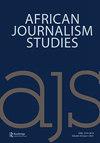Data Journalism Practice in Sub-Saharan African Media Systems: A Cross-National Survey of Journalists’ Perceptions in Zambia and Tanzania
IF 1.8
3区 文学
Q3 COMMUNICATION
引用次数: 10
Abstract
ABSTRACT This study explores the state of data-driven journalism practices in Sub-Saharan Africa. It aims at examining journalists’ perceptions of data-driven journalism in Zambia and Tanzania as it attempts to redefine and demystify the concept. We base our hypotheses on the notion that most journalists in Zambia and Tanzania perceive data journalism as a field that cannot be defined outside quantitative methods—approaches mostly emphasized by western scholarship. Our cross-national survey findings suggest that journalists from Zambia and Tanzania do not consider themselves as data journalists even when they practice it. This is because of the lack of advanced computer-assisted reporting equipment and the dwindling skills in advanced quantitative methods that are mostly accompanied by statistical software. Findings also suggest that female journalists showed more scepticism of data journalism practice, leading to fewer women with interest in pursuing data journalism in Zambia and Tanzania撒哈拉以南非洲媒体系统中的数据新闻实践:赞比亚和坦桑尼亚记者观念的跨国调查
本研究探讨了撒哈拉以南非洲地区数据驱动的新闻实践状况。它旨在检查记者对赞比亚和坦桑尼亚数据驱动新闻的看法,因为它试图重新定义和揭开这个概念的神秘面纱。我们的假设基于这样一种观念,即赞比亚和坦桑尼亚的大多数记者认为数据新闻是一个不能在定量方法之外定义的领域,而定量方法主要由西方学者强调。我们的跨国调查结果表明,来自赞比亚和坦桑尼亚的记者即使在从事数据记者工作时也不认为自己是数据记者。这是因为缺乏先进的计算机辅助报告设备,以及先进的定量方法的技能日益下降,而这些方法大多伴随着统计软件。研究结果还表明,在赞比亚和坦桑尼亚,女性记者对数据新闻实践表现出更多的怀疑,导致对从事数据新闻有兴趣的女性人数减少
本文章由计算机程序翻译,如有差异,请以英文原文为准。
求助全文
约1分钟内获得全文
求助全文
来源期刊

African Journalism Studies
COMMUNICATION-
CiteScore
1.90
自引率
10.00%
发文量
18
期刊介绍:
Accredited by the South African Department of Higher Education and Training for university research purposes African Journalism Studies subscribes to the Code of Best Practice for Peer Reviewed Scholarly Journals of the Academy of Science of South Africa. African Journalism Studies ( AJS) aims to contribute to the ongoing extension of the theories, methodologies and empirical data to under-researched areas of knowledge production, through its emphasis on African journalism studies within a broader, comparative perspective of the Global South. AJS strives for theoretical diversity and methodological inclusivity, by developing theoretical approaches and making critical interventions in global scholarly debates. The journal''s comparative and interdisciplinary approach is informed by the related fields of cultural and media studies, communication studies, African studies, politics, and sociology. The field of journalism studies is understood broadly, as including the practices, norms, value systems, frameworks of representation, audiences, platforms, industries, theories and power relations that relate to the production, consumption and study of journalism. A wide definition of journalism is used, which extends beyond news and current affairs to include digital and social media, documentary film and narrative non-fiction.
 求助内容:
求助内容: 应助结果提醒方式:
应助结果提醒方式:


